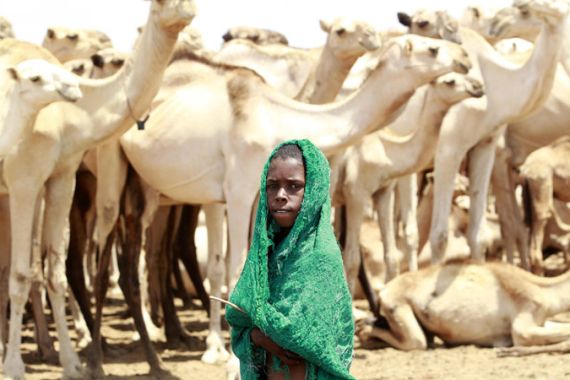Obama echoes East Africa’s pleas for help
US president calls for “international response” to famine in Horn of Africa, as Somalia appeals for more drought relief.

An appeal for more famine relief by Somalia’s president has been echoed by US President Barack Obama who has called for an “international response” to the humanitarian crisis in the Horn of Africa.
President Sharif Sheik Ahmed said on Friday that Somalia can no longer feed the overwhelming number of its people suffering from famine brought on by the worst regional drought in nearly 60 years.
Keep reading
list of 4 itemsBirth, death, escape: Three women’s struggle through Sudan’s war
Mapping Israel-Lebanon cross-border attacks
Nearly 55 million face hunger in West and Central Africa, UN warns
Ahmed said his government has created several refugee camps, but that Somalia needs urgent support to reach the level of aid that is needed.
A Somali government spokesman went further, saying the famine response from aid agencies “is too slow” and that the crisis is even more severe than the UN has said. He noted that diseases are spreading through the camps, including measles.
“The current famine situation in Somalia actually demands urgency, not only assessments and far-off responses, because many Somali children are dying in the county on a daily basis for lack of help,” said Abdirahman Omar Osman.
“We are asking the international community to increase their efforts and help these people facing misery. We believe the famine is bigger than the UN said.”
Al Jazeera’s Haru Mutasa reporting from Kenya’s Dadaab, the world’s largest refugee camp, said there has been a constant stream of refugees into Kenya.
She said UN aid agencies say 1,500 people arrive daily and they fear the number could increase.
“The refugee camp at Dadaab is full, so those who arrive, camp outside it. Aid agencies are trying to move these people from make-shift shacks to tents,” our correspondent said.
“There is a big plan to move about 180,000 people into tents, but with each tent costing $250 each, it requires lot of money.”
Our correspondent said, with the refugees from Somalia flooding the area, the local Kenyans as well as some senior politicians are becoming wary of their presence.
“Many of the refugees have been living here since they first came in 1991 due to the conflict in Somalia.
“The locals complain that they are being overlooked despite the fact that drought has also affected parts of Kenya.”
Call for global aid
After meeting in Washington with the leaders of four French-speaking African nations, Obama said millions are in danger of starvation and he regretted that the famine was still not gaining enough attention in the US.
“We discussed how we can partner together to avert the looming humanitarian crisis in Eastern Africa. I think it hasn’t got as much attention here in the United States as it deserves,” Obama said on Friday.
He added that the famine in East Africa, where nearly half of Somalia’s 10 million people are in need of relief assistance, “is going to require an international response and Africa will have to be a partner to make sure that tens of thousands of people don’t starve to death”.
Obama held talks with four West African leaders, including Ivory Coast’s new President Alassane Ouattara. Benin’s President Boni Yayi, President Alpha Conde of Guinea and President Mahamadou Issoufou of Niger were also at the White House meeting.
The drought and the famine it has caused in Somalia have affected more than 11 million people, including 2.2 million Somalis who live in territory controlled by al-Shabab fighters in south-central Somalia where aid groups cannot deliver food.
A second UN plane landed in Mogadishu on Friday with more than 20 tons of nutritional supplements on board. A Kuwait Air Force transport plane also landed in the capital and offloaded sacks of food.
The World Food Programme (WFP) said with its second delivery on Friday it has airlifted nearly 31 tons of ready-to-use food into Mogadishu. A WFP plane with 10 tons of peanut butter landed Wednesday in Mogadishu, the first of several planned airlifts in coming weeks.
WFP says it is supplying a hot meal to 85,000 people daily at 20 feeding centres in Mogadishu, but many refugees cannot find the feeding sites or do not know about them.
“Our feeding centres continue to operate in spite of the difficult security situation and WFP is moving stocks out of our warehouse in Mogadishu to feed growing numbers of internally displaced Somalis who have fled the famine zone to the capital,” the UN agency said.
Trading fire
The appeals for more humanitarian aid came as African Union and al-Shabab fighters traded fire at a new front line in Mogadishu on Friday.
The African Union military force fears that al-Shabab fighters may try to attack the camps that now house tens of thousands of famine refugees in the Somali capital, disrupting the distribution of food aid.
A new AU offensive that began on Thursday has seen AU troops move up the east side of Mogadishu’s largest market, Bakara. The troops now control three sides of the market and an AU force said Friday that the gains mean that tactically speaking the AU essentially controls the market.
Forces are now moving toward the city’s large sports stadium, from which al-Shabab fires artillery, the spokesman said.